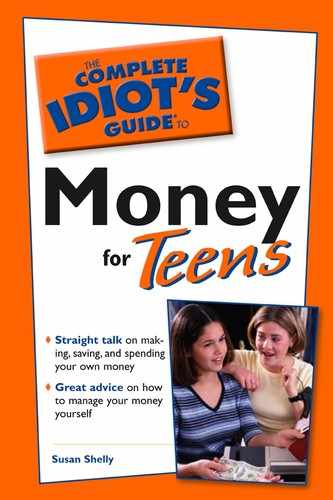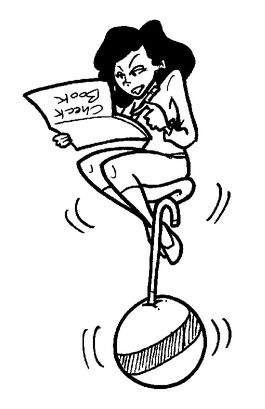
Chapter 13
The Great Balancing Act
In This Chapter
✧ Deciding whether you need a checking account
✧ Understanding different types of checking accounts
✧ Determining your banking needs
✧ Choosing the account that makes sense for you
✧ Keeping track of your checking account
Now that you’ve learned about saving and spending money, it’s time to consider how you’ll keep track of what you have. When you were a little kid it was easy to keep track of your money. You probably kept it in a bank in your room and took out what you needed when you wanted to buy something. Now that you (presumably) have more money than you used to it doesn’t make sense to keep all of it on top of your dresser or stashed in a drawer.
You might have (hopefully) opened a savings account, or maybe you’re thinking of opening one. Perhaps you’ve even looked into setting up a money market account or a certificate of deposit. Those are great vehicles for safekeeping of money that you don’t need access to and they allow you to earn interest on that money. What do you do, however, with money that you need to have available to use when you want it?
An alternative to keeping the money in a box on your dresser is to open a checking account. In this chapter, we learn about different kinds of checking accounts, why you might need one, and how to use an account once you have it. Maintaining and using a checking account isn’t difficult, but it does require some time and attention.
Americans started using checks one year after the National Banking Act of 1864 established the dollar as the national currency, and we never looked back. Nowadays, Americans write more than 65 billion—that’s billion—checks each year, and the number increases annually. Let’s look first at who needs a checking account, and find out if one might be right for you.
Knowing When You Need a Checking Account
If you have expenses for which it’s not convenient—or not smart—to use cash, you probably would benefit from a checking account. You’ll run into more and more occasions as you get older in which writing a check is the only way to go. You probably can still pretty much get away with using cash at this point, but it’s not always a good idea.
For instance, you shouldn’t send cash through the mail; it’s just not a smart thing to do. Envelopes get ripped or unsealed. Stuff falls out of envelopes. If you pay for something with cash, you have no record or proof of payment like you do when you write a check or use a money order. For those reasons, it doesn’t make sense to use cash to pay bills by mail, or to pay for items you buy from catalogs, or to send cash through the mail for any reason.
If you owe $96 at Macy’s for your back-to-school shopping spree, and you don’t want to send cash in the mail, you could take it to the store and pay your bill. Again, however, it doesn’t make sense to walk through the mall with almost $100 in your purse or pocket. Purses get stolen or lost and people carrying almost $100 sometimes see something on their way to Macy’s bill department that they decide they simply can’t live without. So, the best way to pay your Macy’s (or whatever) bill is to write a check that you can either mail or deliver to the store.
A checking account is a bank account in which you keep money that you want to be accessible. Your money sits in the account until you write a check in the amount that you need. When you write the check, the money is deducted from your account.
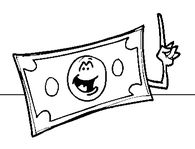
Money Matters
Writing a check is a lot like paying for something with a debit card: Both cause money to be deducted from your checking account.
Let’s say you have $100 in your checking account and you just got a notice that you owe $15 for your school yearbook. The notice says that no cash will be accepted and that checks should be made payable to your school. When you write out a check to your school (that’s making a check payable to), the amount of the check—in this case $15—will be deducted from the $100 in your checking account.
There are some real advantages to using checks instead of cash.
Not all teens need to have checking accounts, but if you get bills in your name or are responsible for paying for expenses that crop up at school or otherwise, it’s probably a good idea to have one. If you think that having a checking account might be a good idea for yourself, read on. If you don’t think you need one now, read on anyway—you can keep the information in mind for later.
Finding a Checking Account That’s Right for You
It’s important to remember that there are big differences among checking accounts. Not all accounts are created equal, and you need to know what you’re getting into before you agree to open a particular account.

Money Matters
For all kinds of information relating to banks, banking, and other money topics go to Bankrate.com, found at www.bankrate.com
To get an idea of what’s out there, you’re going to need to do some shopping. You see, there are various kinds of checking accounts. There are …
✧ Interest-bearing accounts
✧ Non-interest-bearing accounts
✧ Joint accounts
✧ Senior or student accounts
✧ Lifeline accounts
✧ Express accounts
When you’re considering opening a checking account, the first thing you need to do is think about how you’ll use it. You probably won’t be writing many checks unless you have special circumstances. Try to estimate about how many checks you’ll write each month.
If for some reason you write a lot of checks, you need to consider that when you shop for the right account. Some checking accounts carry a fee for every check you write. If you write a lot of checks, an account with a fee for every check you write doesn’t make sense for you. However, if you’ll be writing only two or three checks each month, that kind of account might be right for you because it might have lower overall fees that would make up for the cost of writing checks. Let’s look at some different kinds of checking accounts.
Interest-Bearing Accounts
Interest-bearing accounts are great, if you can find them. However, they usually require a minimum balance to open, and you probably need to maintain a minimum balance to avoid fees.
Some interest-bearing accounts pay a flat interest rate, but others vary the rate depending on your account balance—the higher the balance, the more interest you earn. Still, the average interest rate on checking accounts is low—less than 2 percent.

Imagine That
The average interest rate on checking accounts is 1.52 percent, according to Bankrate.com. Better than nothing, but not much to get excited about.
Some banks give you interest on your checking account if you also have a savings account in which you maintain a minimum (usually pretty high) balance. If you can find a no-strings-attached, interest-bearing checking account, go for it. But, be sure you ask a lot of questions and make sure you have all the information concerning any account before you sign on the dotted line.
Non-Interest Bearing Accounts
A non-interest-bearing account, obviously, does not pay you any interest on the money you have in it, but if you can find a free checking account or a low-fee account, you might be better off in the long run. Most teenagers don’t have enough money in their checking accounts to earn a lot of interest. It’s a better trade-off to give up interest in exchange for not getting socked with a lot of bank fees.
Non-interest-bearing accounts sometimes are called basic checking accounts, and are intended for customers who don’t maintain high balances. Some basic accounts require that you maintain a low minimum balance to avoid fees.

Scary Stuff
There are advantages to joint checking accounts, but there can be a downside as well. If one person writes a check (especially a big one) and forgets to tell the other, chances for an overdrawn account increase. If you ever have a joint account, be meticulous about your record keeping.
Joint Checking Accounts
A joint account is one that’s owned by two or more people who share equal access to the money in it. It’s usually used by people who live together and share household expenses. Each person’s name appears on the checks.
Checking accounts aren’t the only bank accounts that can be joint accounts. Savings and money market accounts also can be in more than one person’s name.
Senior or Student Checking Accounts
Many banks and credit unions offer special deals for students and senior citizens. Be sure to ask about this when you’re shopping for your checking account. You might be eligible for free checking, free ATM use, and even more.
Lifeline Checking Accounts
Lifeline checking accounts are for low-income customers. They don’t offer a lot of extras, but fees are very low (usually from nothing to $6 a month), and usually they don’t require a minimum balance. Some states require that banks offer these types of accounts and even set the terms and conditions for them.
Express Checking Accounts
Express checking accounts are specially designed for people who would rather do their banking electronically or by phone, rather than dealing face to face with a teller. Express accounts usually have low or no monthly fees, no limit on the number of checks you can write, and low minimum balance requirements. You should know, however, that if you open this type of account and then for whatever reasons need the services of a bank teller, you’ll pay for those services. Some banks charge $3 or more for express customers to see a teller.
Now that you know a little about different kinds of accounts, how do you go about picking the one that might be right for you? In the next section, we’ll provide a whole list of questions you should ask at each bank while you’re shopping for the best checking account. Then you can compile your information and see which account makes the most sense for you.
Questions to Ask When Shopping for a Checking Account
There are lots of questions you should ask when considering a particular checking account and you’ve got to be willing to take a little time to do so. If a bank employee isn’t willing to spend some time with you to answer your questions, either in person or by phone, you don’t want to be a customer at that bank.
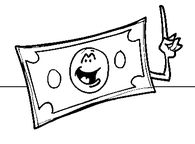
Money Matters
If you’re treated rudely by a bank employee, get on the phone and report the incident to the manager. Tell whomever answers the phone that you have a complaint and would like to speak to the appropriate person. Be sure that you’re polite and respectful, but don’t let the matter go unnoticed.
Some things to ask about include the following:
✧ How much money do I need to open the account?
✧ Does the account pay interest?
✧ Do you have special accounts for students?
✧ Is there a monthly service charge on the account?
✧ Must I maintain a minimum balance to avoid fees?
✧ Is there a limit on the number of checks I can write each month?
✧ How much will it cost to order new checks?
✧ What is the fee for an overdrawn account?
✧ Does the bank offer overdraft protection?
✧ Is there a fee for overdraft protection?
✧ Will I get the checks I write returned with my monthly statement?
✧ How many days between the time I deposit money in my checking account and the time I can write checks on that money?
✧ Can I check my account balances and account history by telephone or computer?
✧ Is there a fee for me to check my account balances or get my account history?
✧ Are checking fees waived if I keep a minimum balance in a savings account in the same bank?
I know that this sounds like a lot to find out from every bank you talk to. However, it’s worth taking the time to do because checking accounts vary so much from one bank to another.
As you talk to bank employees take notes to keep all the information sorted out. Don’t be afraid to take your time to get all the information you need. You’re a potential customer and should be important to the bank.
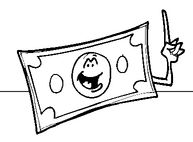
Money Matters
It sounds like an obvious matter, but consider the location of the bank you’ll be dealing with before choosing a checking account. Will it be convenient for you? Will you be able to get there?
How to Write a Check
Writing a check is easy, because each check tells you what you need to include. Let’s look at the information you need to include when you write a check:
✧ The complete and accurate name of the person or company to which you’re writing the check. Don’t use nicknames, and be sure you have the complete and correct name for stores, catalogue services, or whatever.
✧ The correct date. Don’t try to fool your bank by putting a later date on a check because you’re not sure you have money to cover it. Make sure the date you use is correct.
✧ The amount of the check in numbers. Make sure you start writing the numbers close to the printed dollar sign. Writing the amount so that it looks like this: $ 130.00 gives opportunity for an unscrupulous person to slip in an extra number or two.
✧ The amount of the check in words. Start as far to the left of the line as possible to give yourself room. If there’s room left over to the right of the line, fill in the rest of the space with a wavy line.
✧ Your full signature. This should be signed as it appears on the signature card you filled out when you opened the account.
✧ A memo. Use this line to write any notes or information you think you might need concerning the check. If you’re paying a bill, many companies request that you write your account number on the memo line to help them process your payment more easily.
Keeping Track of Checks You Write
It’s not difficult to keep track of the checks you write, but it does require diligence and attention. If you don’t keep track of every check you write, you won’t know how much money you have in your account and you’ll be at risk for bouncing a check. Bouncing a check is what happens when you write a check that’s for more money than you have in the account.
Banks really don’t like it when customers bounce checks and they often charge hefty fees when it happens—the average is $25 a bounce. Also, even one bounced check can make it difficult to get another checking account.
If you’re writing a check and it’s inconvenient at that moment to take the time to record it in your checkbook, write the information on another piece of paper and put it someplace where you’ll be able to find it later. Just don’t forget to write it in your checkbook as soon as possible.
Balancing Your Checkbook
Some people actually enjoy balancing their checkbooks. For others, it’s worse than final exams or a blind date with the son or daughter of your mother’s old college friend. Regardless of whether or not you like to do it, balancing your checkbook is a job that needs to be done. Trust me on this: Faithfully balancing your account will save you from some very serious hassles.
Keeping Your Balance in Balance
Remember, there’s more to consider when balancing your checkbook than just the checks you write. If you have an ATM card (much more about those in Chapter 14, “ATMs and Debit Cards”), those transactions need to be considered. So do any fees your bank has charged you. Don’t overlook anything that affects your account. Once you’ve identified everything that will affect your account, you need to subtract it from your account balance. Don’t forget to record any deposits you’ve made since your last statement, too, and add them to the balance.
Use your bank statement to help you when you’re balancing your checkbook, but don’t assume that the statement is always 100 percent correct. Banks sometimes make mistakes, you know. If you see something on the statement that doesn’t look right, don’t hesitate to call your bank to check on it.
Don’t Spend That Money Yet!
To really understand and be able to accurately keep track of your checking account and avoid bouncing checks, it’s important that you know your bank’s check-hold policy. Let’s say that Uncle Bob comes through for your birthday with a check for $50. You promptly write him a thank-you note, and then walk down to the bank to deposit the gift in your checking account.

Imagine That
Be on the lookout for new technologies that might make checking a lot easier in the future. E-check transactions eliminate paper checks all together and electronic check presentment combines the use of paper and electronics.
On the way back from the bank, you pass your favorite sports store and notice there’s a big sale going on. You go in and, sure enough, that bright-orange Reebok fleece that you’ve had your eye on for weeks is on sale for only $39.99. Hardly able to believe your luck, you whip out a check and use it to buy the fleece, which you happily wear to walk the rest of the way home.
Things stop looking so good, however, when you find out from your bank that you’ve been charged $25 because you overdrew your account. If you’d been aware of your bank’s check-hold policy, you would have known that it routinely holds checks for two days or more before crediting them to depositors’ accounts.
Obviously, this policy can cause a great deal of trouble if you’re not aware of it. Banks are permitted to do this, and it’s up to customers to read the regulations carefully to learn about it. Checks for very large amounts, or that come from another state, can be held up to eight days. Another thing to consider is that a deposit made after a certain time of day might not be processed until the following day. If you show up Wednesday afternoon at 4:00 P.M. to deposit a check, chances are you might have missed the transaction cutoff for that day, and your deposit won’t be processed until Thursday. Understanding these policies can help you to more easily keep track of what’s going on with your checking account.
Don’t assume that just because you have a checking account you have to use it for everything. Cash is fine—even preferable—for small purchases, and will make balancing your checkbook easier than if you write checks for every little thing you buy.
The Least You Need to Know
✧ Not everybody needs a checking account, but if you’re responsible for bills in your name or paying for other items, it’s a good thing to consider.
✧ There are different kinds of checking accounts, so you’ll have to find the one that best meets your needs.
✧ Don’t be afraid to ask a lot of questions when shopping around at different banks for a checking account; and don’t be intimidated by bank employees who might be reluctant to take the time to answer those questions.
✧ Taking time to record each transaction that affects your checking account and to balance your checkbook each month will save you lots of trouble in the long run.
✧ You need to understand all of your bank’s policies that affect your checking account to balance your checkbook properly.
..................Content has been hidden....................
You can't read the all page of ebook, please click here login for view all page.
